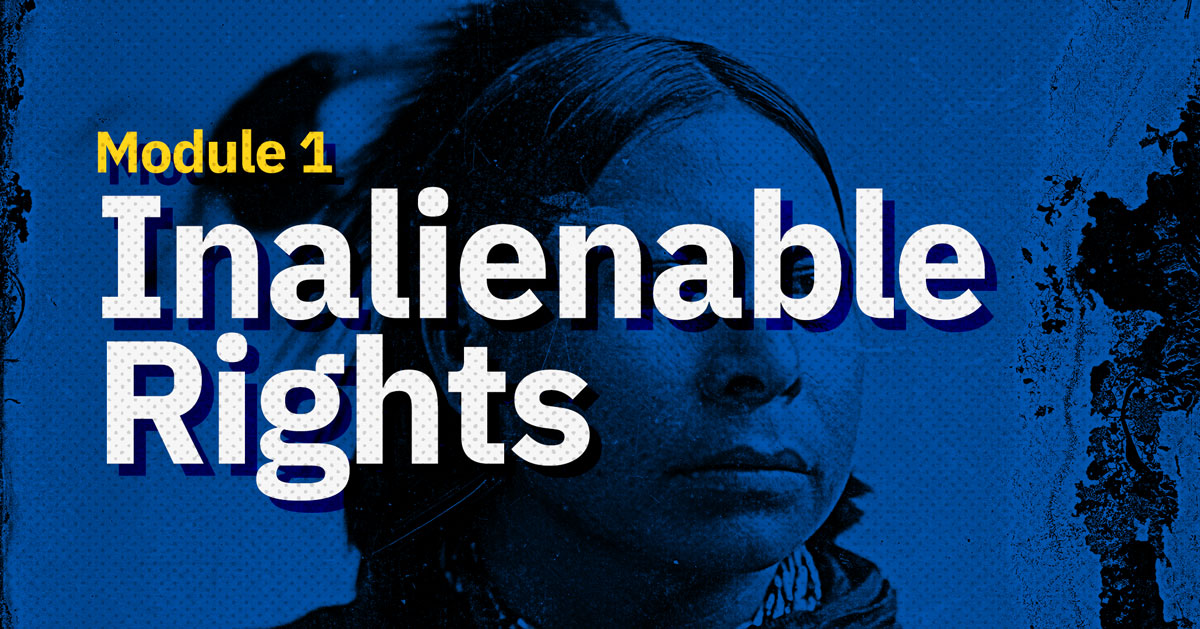
Module 1: Inalienable Rights
Lesson Overview
- Has the United States made good on its promises of life, liberty, and the pursuit of happiness for all?
- Identify laws and protections that the United States has placed upon Indigenous and rural communities.
- Analyze primary-source documents to engage in a civil-discourse model.
- Participate in a Paideia Seminar to gain a fuller understanding of life, liberty, and the pursuit of happiness among rural and Indigenous communities.
- Students demonstrate their understanding of inalienable rights granted and/or taken from Indigenous and rural American communities by examining laws, proclamations, acts, and protections.
- Students will discuss the concepts of life, liberty, and the pursuit of happiness as it relates to Indigenous and rural communities by participating in a Paideia Seminar.
- Teachers may assess by using the Assessment Rubric.
- Students will participate in self-reflection by completing the Inquiry Reflection Tool.
- Active listening
- Analyzing evidence
- Applying evidence
- Civic engagement
- Civic mindedness
- Civility and respect
- Close reading
- Collaboration
- Communication
- Critical thinking
- Empathy
- Evidence-based learning
- Incorporation of evidence
- Open mindedness
- Respectful communication
- Self-reflection
- Active listening
- Analyzing evidence
- Applying evidence
- Civic engagement
- Civic mindedness
- Civility and respect
- Close reading
- Collaboration
- Communication
- Critical thinking
- Empathy
- Evidence-based learning
- Incorporation of evidence
- Open mindedness
- Respectful communication
- Self-reflection
*Note: This SEL focus will be further articulated in alignment with the lesson below*
Center for Civic Education
We the People: The Citizen & the Constitution (Level 2)
- Unit 2, Lesson 8: What basic ideas about government are in the Declaration of Independence?
- Unit 5, Lesson 26: How does the Constitution safeguard the right to equal protection of the law?
Educating for American Democracy Roadmap
Theme 3: We the People:
- Evaluate the extent to which marginalized groups have won incorporation into “the people” and advanced the shared values and principles of the U.S.
Theme 7: A People with Contemporary Debates & Possibilities:
- Understand how fundamental American principles—and continuing debates about them—shape current policy debates
College, Career, and Civic Life (C3) Framework
- D2.Civ.3.6-8. Examine the origins, purposes, and impact of constitutions, laws, treaties, and international agreements.
- D2.Civ.8.6-8. Analyze ideas and principles contained in the founding documents of the United States, and explain how they influence the social and political system.
Common Core Standards for Literacy in Social Studies
- CCSS.ELA-Literacy.RI.8.3: Analyze how a text makes connections among and distinctions between individuals, ideas, or events (e.g., through comparisons, analogies, or categories).
- CCSS.ELA-Literacy.RI.8.7: Evaluate the advantages and disadvantages of using different mediums (e.g., print or digital text, video, multimedia) to present a particular topic or idea.






